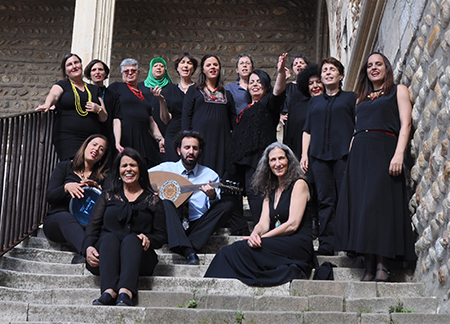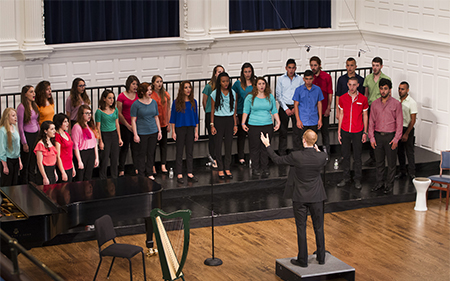Arts
Music
Choirs in Israel Listen, Then Harmonize

On a Tuesday evening in Jaffa, more than a dozen women, some in skirts, others in pants and at least one wearing a hijab, gathered in a large room on the main floor of a community center. Sipping coffee and nibbling cake, they comfortably shared anecdotes about their lives, their children and grandchildren.
Settling into a loose semicircle of chairs, they finally got down to business with a few vocal exercises. Then, directed by a woman seated behind a keyboard and another keeping the beat with a darbuka drum, they started singing the complex harmonies of a Ladino wedding song for an upcoming performance.
These Jewish, Muslim and Christian women are members of the Rana Choir, and the get-together was one of their weekly choir practices. Their conversations eschew politics for the personal, but the choir’s musical repertoire—mostly folk songs from Israel, the Jewish Diaspora and the Arab world—reflects the group’s diverse cultural interests and viewpoints.
While amateur music groups are common throughout Israel, the Rana Choir is among the few musical initiatives in the country designed to bring Israelis of different backgrounds together. Other such programs include the Jerusalem Youth Chorus, whose members are teens from West and East Jerusalem, and the VocaTikva Ensemble, which organizes several groups of youngsters from different ethnic, religious and socioeconomic backgrounds. In a country where people often shout at one another, these choirs believe it’s better to listen and harmonize.
Founded by Mika Danny and Idan Toledano, the 18-member Rana Choir has been in existence for a decade, first as a project of Jaffa’s Arab-Jewish Community Center and, as of 2016, as an independent entity. Its members include women from their 30s to 70s, all of whom live in Jaffa. In addition to Ladino, the choir, which performs throughout Israel, has sung in Farsi, Yiddish, Hebrew and Arabic.
Learning Arabic songs has had a profound impact, said 75-year-old Jewish member Phoebe Tzadok, who has been with the choir since its inception. Performing Palestinian music about the desire for a home and for love humanizes the other side and has helped her overcome her prejudices, she said. Tzadok, who made aliyah from Morocco with her family when she was 7, grew up speaking Arabic but did not have many personal interactions with Arabs before joining the choir. The folk music “reflects their pain and longing,” she noted of her Israeli Arab co-singers.
Taking part in the choir helps Muslim member Alia Hattab defy prejudices within her own community. Traditional Muslim culture frowns on women leaving their homes in the evening and, much like in ultra-Orthodox Jewish circles, some prohibit singing for a mixed-gender audience.
“My mother used to sing and chant at public religious events”—ones for women only—“and she is my role model,” said Hattab, 68, who wears an abaya (long robe) and hijab to practices and performances. “My husband supports me in my choice to join Rana.
“But,” she added, “I didn’t ask his permission.”
Hattab’s family has lived in Jaffa for nine generations. Her daughters, Badriah and Sihrab, are also choir members. “I grew up with Jews from the various aliyot,” she said, “so being in a choir with Jewish women feels natural to me.”
The Rana Choir’s arrangements reflect a natural melding of the many cultures of Israel. Indeed, the women are known for their ethnic song mash-ups: “Asham,” available on the choir’s recently released eponymous debut album, intersperses a traditional Palestinian love song with verses from the Song of Songs. Their signature number is an original Hebrew-Arabic-Aramaic arrangement of the classic Passover song “Chad Gadya,” which also appears on the album and on the choir’s Facebook page. Based on the 1989 Hebrew rendition by Israeli singer Chava Alberstein, the piece is enriched with new lyrics—sung in both Hebrew and Arabic—added to the traditional Aramaic verses, including: “….On all other nights I ask the four questions, but tonight I have one more: How long will the cycle last?/ How long will the cycle of violence last?”

While choir singers consider their time together a refuge from the nonstop news cycle, Micah Hendler, founder and director of the Jerusalem Youth Chorus, has purposely made discussions about the Israeli-Palestinian conflict a key element of his approach. At the weekly four-hour sessions, which take place in a large room in the Jerusalem International YMCA building, the 30 teenage members of the chorus sing and engage in dialogue. The songs range from pop standards to folk and even gospel. The dialogue, sandwiched between singing sessions and guided by trained facilitators, ranges as well, from discussions sparked by the news to concepts such as equality, freedom and justice.
“The idea is for the teens to go beyond the headlines and think more critically about what they deem to be black, white or gray,” said Hendler, 29, who arrived in Israel in 2012 after graduating from Yale University with a degree in music and international studies.
At one Monday session last fall, the dialogue began with gender equality. The initial prompt urged the teens to think about what it would be like to switch genders with another member of their community. A 15-year-old Muslim boy from East Jerusalem who asked to not give his name insisted that women belong in the home and that in Muslim communities, “they are treated like queens”—though he would not change places with the women he knows.
When the discussion moved to equality between Israelis and Arabs, the same teen declared it “messed up that Palestinians don’t have the same rights as Israelis.” He then realized that he was expressing a desire for “equality” for himself, while at the same time withholding it from women in his community.
Most of the songs practiced by the chorus are not necessarily integrated into their dialogue. “We sing about different elements or building blocks that could lead to peace,” said Hendler, “whether that is sharing a sense of home, overcoming loss or believing in the religion of love.”
“Home,” a 2014 pop-a cappella medley performed by the chorus with American singer/songwriter and video producer Sam Tsui, is one example. The video includes images of Jerusalem meaningful to chorus members, from the Arab shuk to the Kotel to the crowded streets of the city. The video has over 400,000 views. The group has toured throughout Israel as well as internationally and has performed on The Late Show With Stephen Colbert and at the Kennedy Center in Washington
Not far from Jaffa, in south Tel Aviv, the VocaTikva Ensemble brings youth of different backgrounds together with a focus on hard work and a cappella music.
Ben Yefet, a gifted young musician and conductor, founded VocaTikva in 2011 as his national service project. His goal was to provide an outlet for musically inclined teens from lower-income families in the Tikvah neighborhood of Tel Aviv. He found himself working with both religious and secular youth from the area in weekly sessions that focused on vocal ability, harmony and musical composition as well as on cooperation and leadership.
“The main goal was to teach music,” said Chen Kraus, who joined the group in 2012 as executive director while Yefet, now 27, became artistic director. “But the byproduct was that music brought young people together and helped them toward self-
fulfillment.”
The music the group performs, largely American and Israeli pop, are social statements, too. The group’s upbeat adaptation of David Guetta and Nicki Minaj’s “Hey Mama” was a response to the treatment of women in Israel. The original was broadly criticized for verses such as, “Yes I do the cooking / Yes I do the cleaning” and “Yes you be the boss / Yes I be respecting.”
VocaTikva’s counter to the song speaks of the responsibility that singers have to their fans, with lyrics like, “Girls around the world are always watching you / Do you even care Nicki / Do you have a clue?/ What it will make a young woman do?”
In 2016, VocaTikva launched the Voca Project, creating ensembles for teens in a handful of central Israeli cities, including Netanya, Jaffa and Bnei Brak. The new ensembles are largely run by members of the original group, who still sing together and have performed at the president’s residence in Jerusalem among other high-profile venues.
According to Kraus, 27, a cappella is the perfect musical tool for what VocaTikva wants to achieve. “It’s the most social type of music,” she said. “Everyone gives their own voice for the song to succeed. You have to listen to one another.”
Indeed, listening is at the core of all of these musical initiatives.
At the Monday evening session, members of the Jerusalem Youth Chorus were wrapping up what was the first rehearsal of the school year, saying their goodbyes and listening as Hendler, alternately speaking in English, Hebrew and Arabic, gave them some reminders before they left.
Nadir, 15, who has a Muslim father and Jewish mother—a rarity in Jerusalem—was packing up his stuff, preparing to go home to the East Jerusalem neighborhood of Beit Hanina. He said that he appreciates the “true friends,” both Jews and Arabs, he has met through the chorus. “People here don’t care about your background and religion,” he said. “We come here to learn new things.”
Shahar, 16, who lives on a moshav near Jerusalem, agreed. She came to the chorus to hear “people on the other side of the conflict, to get beyond the stereotypes,” she said. “It is easy to express emotion and ourselves in music. Music can overcome gaps and create discussion.”
Renee Ghert-Zand is a freelance journalist covering Israel and the Jewish world from Jerusalem, where she lives.










 Facebook
Facebook Instagram
Instagram Twitter
Twitter
Leave a Reply